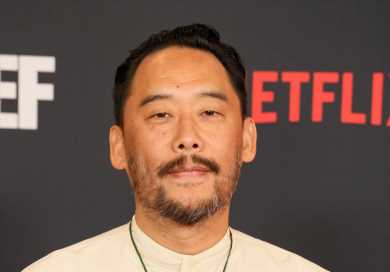David Choe Appears to Issue Copyright Violations Over Resurfaced Interview Detailing Rapey Behavior

David Choe’s role in “Beef” has brought some unsavory comments made by the painter-turned-media personality back into the public eye. A resurfaced 2014 clip from Choe’s former podcast “DVDASA” — an acronym for Double Vag, Double Anal, Sensitive Artist — has attracted particular attention, as Choe can be heard joking about nonconsensual sexual encounters.
In the clip, Choe tells adult film star and podcast co-host Asa Akira that he once forced a masseuse to perform oral sex on him. Choe did not immediately respond to IndieWire’s request for comment.
“She’s not into it but she’s not stopping it either,” Choe said (via Vice). “I take the back of her head and push it down on my dick, and she doesn’t do it, and then I go ‘open your mouth’ and she does it, and then I start face fucking her.”
He continued: “With the rape stuff…I mean, I would have been in a lot of trouble right now if I put her hand on my dick and she’s like, ‘Fucking stop I’m gonna go call security.’ That would have been a much different story. But the thrill of possibly going to jail, that’s what achieved the erection quest.”
Choe, who made hundreds of millions of dollars in Facebook stock after painting murals for the tech giant, added at the time: “I just want to make it clear that I admit that that’s rapey behavior. But I am not a rapist.”
The subsequent bad publicity has prompted Choe to take aggressive measures to prevent the clip from being shared. Many social media users who have posted snippets of the interview over the past few days have claimed they have been sent notices that their tweets would be taken down due to copyright infringement.
Several users shared screenshots of the notice from Twitter which is credited to the non-profit David Young Choe Foundation. It was founded in 2015 and later renamed the Meleka Foundation. The foundation owns all of the podcast episodes and is exercising what it claims is its legal right to prevent unauthorized sharing via the Digital Millennium Copyright Act.
Writers Aurora Bogado and Meecham Whitson Meriweather both posted clips of the interview on their personal Twitter accounts on Thursday, but the videos were both removed on Sunday. Variety has reported that they both received emails Twitter claiming that Choe had filed Digital Millennium Copyright Act claims against them and demanded that the clips be removed immediately.
While it appears that Choe is actively moving to prevent the interview from circulating, he still maintains that his comments were humorous in nature and not descriptive of something he actually did.
Choe issued a statement in 2014 clarifying the podcast remarks, claiming that the story was fabricated for the podcast as a “complete extension of my art.”
“If I am guilty of anything, it’s bad storytelling in the style of douche. Just like many of my paintings are often misinterpreted, the same goes with my show,” Choe said. “The main objective of all of my podcasts is to challenge and provoke my friends and the co-stars on the show. We fuck with each other, entertain ourselves and laugh at each other.then It’s a dark, tasteless, completely irreverent show where we fuck with everyone listening, but mostly ourselves. We create stories and tell tales. It’s not a news show. It’s not a representation of my reality. It’s not the place to come for reliable information about me or my life. It’s my version of reality, it’s art that sometimes offends people. I’m sorry if anyone believed that the stories were fact. They were not! In a world full of horrible people, thank god for us.”
He continued in a separate 2017 post, “I relayed a story simply for shock value that made it seem as if I had sexually violated a woman. Though I said those words, I did not commit those actions. It did not happen. I have ZERO history of sexual assault. I am deeply sorry for any hurt I’ve brought to anyone through my past words…I was a sick person at the height of my mental illness, and have spent the last 3 years in mental health facilities healing myself and dedicating my life to helping and healing others through love and action.”
Choe additionally told The New York Times in 2021 that his controversial story was a way to find rock bottom.
“At that time in my life, I was done with life and chasing a bottom. I wanted out,” Choe said. “I never raped anyone.”
Instead, the story was birthed from the “morbid curiosity to feel an external response to the internal shame I felt,” with Choe concluding, “It was strangely comforting to be so despised. It matched how I felt about myself for the first time.”
Source: Read Full Article